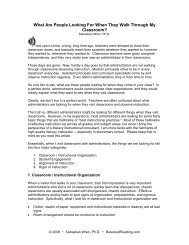The Abecedarian Reading Assessment - Balanced Reading
The Abecedarian Reading Assessment - Balanced Reading
The Abecedarian Reading Assessment - Balanced Reading
Create successful ePaper yourself
Turn your PDF publications into a flip-book with our unique Google optimized e-Paper software.
Appendix A: Research Evidence Justification for<br />
Subtests in <strong>Abecedarian</strong><br />
A good deal of research was consulted to inform the creation of the <strong>Abecedarian</strong> <strong>Reading</strong><br />
<strong>Assessment</strong>. <strong>The</strong> six knowledge domains selected were specifically chosen because there is a<br />
tremendous amount of consensus among researchers that these knowledge domains are<br />
absolutely essential for reading acquisition. <strong>The</strong>re are many ways to teach these domains to<br />
children, but one way or another, they must learn them if they are to be successful readers.<br />
<strong>The</strong> research evidence presented below is just the tip of the iceberg. <strong>The</strong>re is substantial<br />
agreement on the claims made below. People using the <strong>Abecedarian</strong> with their students should<br />
have no concerns about this assessment being “research based.”<br />
Letter Knowledge:<br />
Children need letter knowledge in order to be readers, and letter knowledge is a strong predictor of<br />
reading success.<br />
Bond & Dykstra, 1967; Chall, 1996; Ehri & Sweet, 1991; Stevenson & Newman, 1986; van<br />
Kleek, 1990<br />
Letter knowledge should be fluid and automatic<br />
Adams, 1990<br />
Letter knowledge significantly influences the acquisition of phonological awareness and<br />
phonological processing skills.<br />
Bowey, 1994; Johnston, Anderson & Holligan, 1996; Stahl & Murray, 1994<br />
To be fluent at recognizing letters, students need to be familiar with the distinctive features of each<br />
letter.<br />
Adams, 1990; Gibson, Gibson, Pick, & Osser, 1962; Gibson & Levin, 1975<br />
Phonological Awareness:<br />
A strong, positive relationship exists between phonological awareness and reading skills.<br />
Adams, 1990; Ehri & Sweet, 1991; Goswami & Bryant, 1992; Mason & Allen, 1986; Mann, 1986;<br />
Morais, Mousty & Kolinsky, 1998; Pratt & Brady, 1988; Read, Zhang, Nie, & Ding, 1986;<br />
Shaywitz, 1996; Stahl & Murray, 1994; Sulzby & Teale, 1991; van Kleeck, 1990<br />
Most children do not develop phonological awareness without explicit instruction.<br />
Dickinson & Snow, 1987; Mason, 1980; Masonheimer, Drum & Ehri, 1984; Morais, Mousty &<br />
Kolinsky, 1998; Torgesen, Wagner, and Rashotte, 1994; van Kleeck, 1990<br />
<strong>Abecedarian</strong> <strong>Reading</strong> <strong>Assessment</strong> • www.balancedreading.com • Page 37



